What Is a Narrative Essay?
- Narrative essay definition:
- A type of essay where the writer tells a story based on personal experiences or observations.
- Unlike argumentative essays or expository essays, a narrative essay is a unique piece of writing because it blends storytelling with reflection.
- It sets the tone by using descriptive language, thoughts and feelings, and sensory details to captivate the reader.
- Purpose and adaptability:
- Helps writers make a point through self-discovery and personal growth.
- Encourages adaptability in writing skills since it combines storytelling with structured essay format.
- Narrative essay uses extend from classroom assignments to college admissions essays and even professional portfolios.
- Connection to readers:
- Allows readers to understand the narrative behind new experiences.
- A good narrative essay goes beyond simple storytelling—it makes readers gain a new perspective or insight into life experiences.
- Narrative essay examples highlight how ordinary events can transform into stories that follow meaningful arcs.
Key Elements of Narrative Essay Writing
- Clear thesis statement:
- Even though narrative essays tell a story, they still require a thesis statement.
- The thesis shows the main point of the essay and helps the writer stay focused.
- Strong introduction of a narrative essay:
- Sets the tone for the piece of writing.
- Introduces essay topics or narrative essay topics that the essay will cover.
- Draws readers in by using sensory details or an emotional hook.
- Well-developed plot:
- A story that follows a logical sequence of events (beginning, middle, end).
- Narrative essay examples often showcase plot development that reflects real-life challenges such as starting high school, moving to a new city, or dealing with family changes.
- Character development:
- Includes the writer as the main character, often sharing thoughts and feelings.
- May involve secondary characters who influence the narrative.
- Descriptive techniques:
- Use of sensory details (sight, sound, touch, taste, smell).
- Helps readers understand the narrative as if they are experiencing it themselves.
- Reflection and meaning:
- Goes beyond telling a story—it makes a point.
- Shows how personal growth, self-discovery, or adaptability happened.
- Narrative essay examples emphasize lessons learned and new perspective gained.
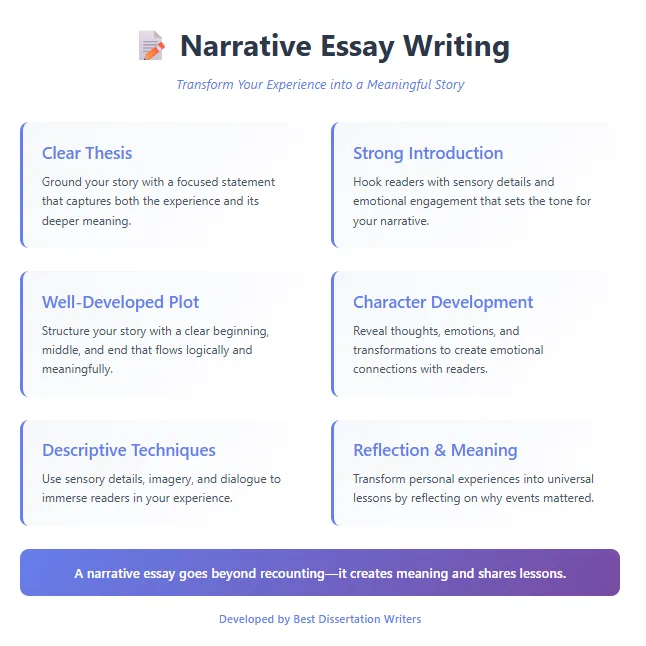
How To Write a Narrative Essay: A 6-Step Guide with Examples
Consistent example used here: A student writing about starting high school as a life-changing experience.
Step 1: Choose narrative essay topics
- Example: “My First Day of High School.”
- Selecting essay topics should focus on life experiences, new experiences, or self-discovery moments.
- Narrative essay examples prove that everyday events can be turned into compelling essays if the story that follows highlights growth.
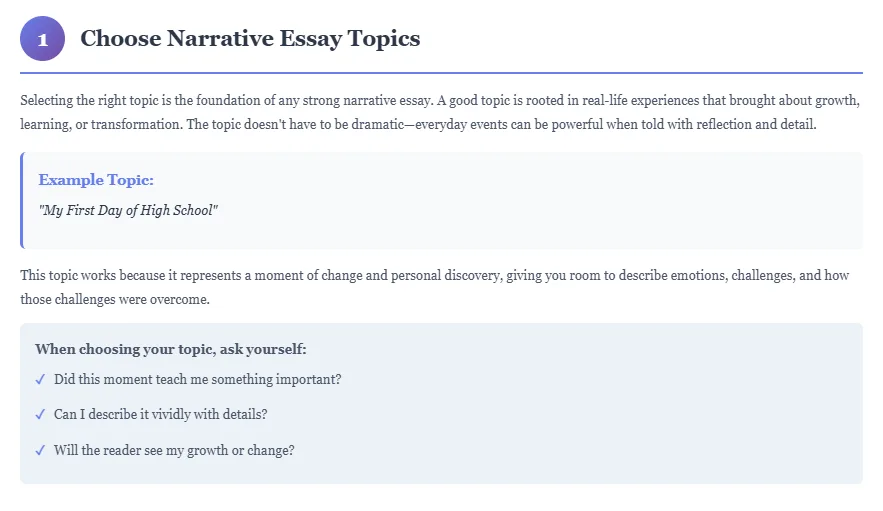
Step 2: Develop a thesis statement
- Example: “Starting high school taught me adaptability and gave me confidence to face challenges.”
- A thesis helps structure the essay and ensures the writer does not drift into expository or argumentative essays.
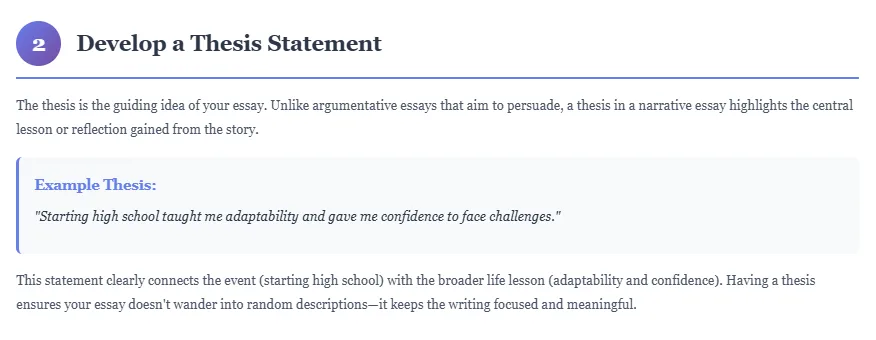
Step 3: Plan the essay format
- Outline introduction, body, and conclusion.
- Example:
- Introduction of a narrative essay: Describe the fear of entering a new school building.
- Body: Tell a story of meeting classmates, feeling nervous, and then finding support.
- Conclusion: Reflect on adaptability and personal growth gained.
- Narrative essay examples follow a clear essay format to help readers understand the narrative smoothly.
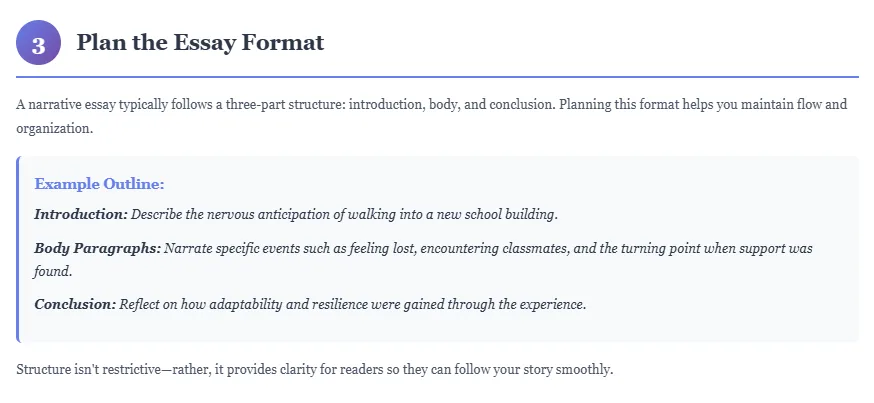
Step 4: Write a captivating introduction
- Example: “As I walked through the wide doors of my new school, the buzz of voices echoed in my ears, and my heart pounded.”
- This sets the tone, uses sensory details, and prepares the reader for a good narrative essay.
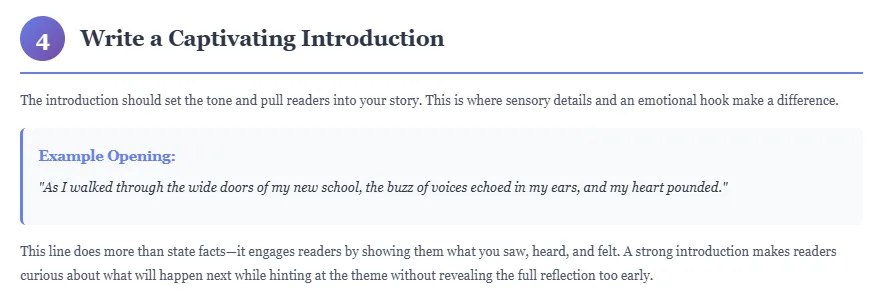
Step 5: Expand the story with details
- Include characters, settings, and events.
- Example: Share thoughts and feelings of being lost, describe sensory details like the smell of fresh paint, and explain interactions with peers.
- Narrative essay examples often show how sentence structure and descriptive essays techniques build immersion.
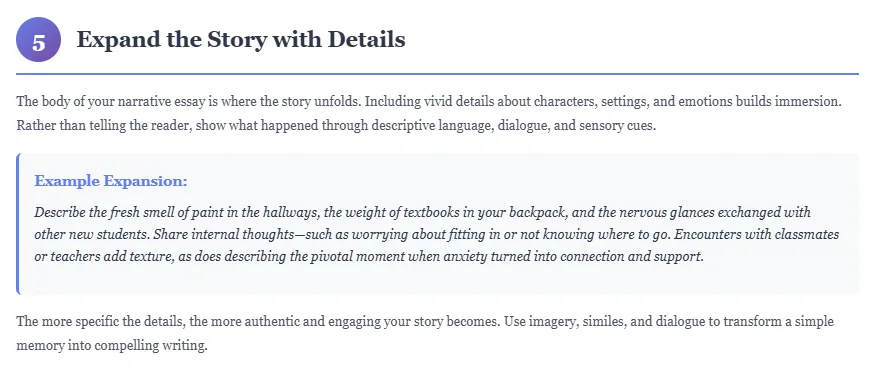
Step 6: Conclude with reflection
- Tie the story back to the thesis statement.
- Example: “Although my first day was filled with anxiety, I learned that adaptability is essential in new environments.”
- Proofread carefully to ensure clarity, sentence structure, and grammar are strong.
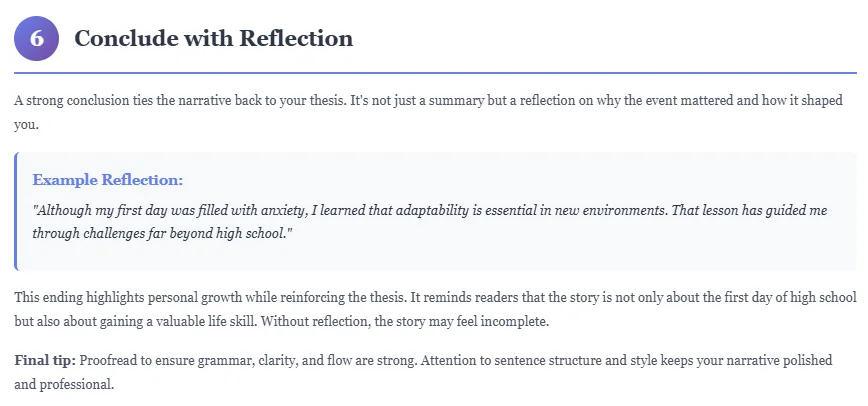
- Need fresh ideas for your next story? Discover creative narrative essay topics that connect seamlessly with the examples in this guide.
How To Use Narrative Essay in Personal Statements
- College admissions and personal growth:
- A narrative essay is a powerful tool in a college application.
- It allows students to show personal growth and self-discovery rather than simply listing achievements.
- Example of a personal narrative: Sharing how overcoming challenges in starting high school developed resilience and adaptability.
- Essay uses in applications:
- College admissions officers look for authenticity and the ability to tell a story.
- Narrative essay examples are effective because they illustrate experiences that shaped the applicant’s identity.
- Comparisons with other essay types:
- Unlike argumentative essays or expository essays, narrative essays focus on life experiences and the ability to captivate the reader.
- Among the four types of essays (argumentative, expository, descriptive essays, narrative), narrative essays stand out as personal and reflective.
- Practical tips for writing your essay:
- Choose narrative essay topics that highlight strengths, adaptability, and unique perspectives.
- Ensure your essay format has a strong introduction of a narrative essay, body with well as plot, and a reflective conclusion.
- Always proofread to polish sentence structure and ensure the narrative essay is a unique, authentic piece of writing.
- Personal stories often highlight bigger lessons. Learn how they transform into thematic essays with thematic depth.
Types of Narrative Essays with Examples
Personal Narrative Essay Examples
- A personal narrative essay shares a story drawn directly from the writer’s life, often focusing on a significant experience or challenge.
- It emphasizes self-reflection, emotions, and lessons learned. (See the example below for how a personal journey unfolds in narrative form.)
Overcoming Stage Fright Through Public Speaking
Public speaking has always been an intimidating task for me, especially during my early teenage years. The thought of standing before an audience made my heart race, my palms sweat, and my voice quiver. For a long time, I avoided opportunities that required me to present, fearing judgment and embarrassment. However, an unexpected challenge in high school became the turning point in my journey, teaching me resilience and transforming my fear into confidence.
The defining moment occurred during my sophomore year when my English teacher announced a class assignment that required each student to deliver a five-minute speech on a personal topic. I contemplated asking for an alternative project, but my teacher emphasized that public speaking was an essential skill for academic and professional growth. That night, I wrestled with anxiety but eventually decided to share a story about my grandmother, who had inspired me through her perseverance. My choice gave me a sense of purpose, but the fear of speaking still loomed heavily.
In the days leading up to the presentation, I practiced relentlessly. I rehearsed in front of the mirror, recorded myself to refine my tone, and gathered my family to serve as an audience. Each attempt reduced my nervousness, though my fear was not fully gone. On the day of the presentation, I stood before my classmates with trembling hands and a shaky voice. Yet as I began speaking about my grandmother’s struggles and achievements, my emotions gradually shifted. Instead of focusing on my anxiety, I connected with the meaning behind my story. I saw attentive eyes and nodding heads, which encouraged me to keep going.
By the end of the speech, I realized that my audience was not scrutinizing me but rather engaging with the narrative. When the class erupted in applause, I felt a wave of relief and pride. The experience taught me that storytelling could be a powerful tool to capture attention and convey meaning. More importantly, it revealed that preparation, authenticity, and focus on the message can overcome fear.
Reflecting on that day, I recognize how critical the experience was in shaping my confidence. Since then, I have embraced opportunities to present at school and in community events. What once felt like a weakness has become a skill I actively cultivate. Overcoming stage fright was not a single victory but the beginning of a continuous journey toward growth. This personal narrative illustrates that challenges, when faced with persistence and reflection, can transform fear into strength.
- Want to see how stories can strengthen persuasion? Review our argumentative essay examples for inspiration.
Descriptive Narrative Essay Examples
- A descriptive narrative essay focuses on vivid sensory details, painting a picture of an event, place, or moment to immerse the reader.
- It uses imagery and atmosphere to make the narrative feel real. (An example below demonstrates how description can bring a new city to life.)
The First Morning in a New City
The first morning I woke up in Chicago was unlike any other I had experienced. I had moved from a small rural town where the loudest sounds were birds singing at dawn and the occasional passing tractor. In contrast, Chicago greeted me with a symphony of honking horns, bus brakes, and the hum of people already on the move before sunrise. I remember sitting upright in bed, overwhelmed yet fascinated, realizing that the rhythm of life here was unlike anything I had known before.
As I stepped out of my tiny studio apartment, the air was brisk and tinged with the smell of roasted coffee from the café across the street. The sidewalks were already alive with hurried footsteps and conversations blending into a blur of noise. The buildings loomed tall above me, casting long shadows that blocked out much of the morning light. It felt as though I had walked into a canyon carved from steel and glass. Every detail—the worn steps at the bus stop, the faded graffiti on the brick wall, the bright neon sign of a diner—seemed to demand my attention.
I wandered into the café, drawn by the scent of espresso and fresh pastries. Inside, the atmosphere contrasted with the city’s fast pace. The warm light softened the room, and the gentle clinking of cups created a sense of calm. A barista smiled warmly as I stumbled through my order, a small kindness that made me feel less like an outsider. I carried my cup to the window and watched as streams of people passed by. Each person seemed to belong—students with backpacks, professionals in suits, delivery workers with carts. Their movements told stories I could only guess at, yet I felt connected to them through the energy of the city.
Walking back, I noticed how even the smallest details spoke volumes. The cracks in the sidewalk hinted at years of footsteps and stories. The street vendors setting up carts reminded me of resilience and daily routine. The rising sun reflected on glass skyscrapers, casting a golden glow that softened their sharp edges. In that moment, I realized the city was not just a place; it was a living entity with its own pulse, one I would need to learn to match.
That first morning in Chicago was more than an introduction to a new environment. It was a lesson in observation and adaptation. By immersing myself in the sensory details—the sounds, smells, and sights—I began to see the city not as an intimidating giant but as a collection of stories waiting to be discovered. That day marked the beginning of my journey toward belonging in a world much larger than the one I had left behind.
- Facts often benefit from context — explore our expository essay examples to see how explanations balance storytelling.
Biographical Narrative Essay Examples
- A biographical narrative essay tells the story of another person’s life or key experiences, blending factual details with storytelling.
- It highlights values, struggles, and achievements through a narrative lens. (Below, you’ll find an example portraying Malala Yousafzai’s determination.)
The Determination of Malala Yousafzai
When the world speaks about courage in the face of oppression, Malala Yousafzai’s story always rises to the forefront. Born in Mingora, Pakistan, in 1997, Malala grew up in a region where access to education, especially for girls, was under constant threat. Despite the dangers, she chose to pursue learning and speak out against the Taliban’s efforts to silence women. Her journey, marked by determination and resilience, continues to inspire millions around the globe.
Malala’s father, Ziauddin Yousafzai, was an educator who believed in the transformative power of education. He encouraged Malala to attend school even when many girls in their community were denied that right. With his support, Malala developed a passion for learning and began to see education as not just a privilege, but as a fundamental human right. By the age of eleven, she was writing a blog for the BBC under a pseudonym, describing life under Taliban rule and the challenges faced by young girls like herself. Her words carried the weight of lived experience and the bravery of a child who refused to stay silent.
Tragedy struck in 2012 when Malala was shot in the head by a Taliban gunman while riding home from school. The attack was intended to silence her advocacy, but instead, it amplified her voice worldwide. After surviving the near-fatal assault, Malala was flown to the United Kingdom for treatment. Recovery was slow and painful, yet she emerged stronger and more determined than ever. Her survival symbolized not just her personal resilience, but also the resilience of all young women who continue to demand education in the face of adversity.
Following her recovery, Malala co-founded the Malala Fund, an organization dedicated to ensuring that every girl has the opportunity to learn for twelve years, free and safe. In 2014, at the age of seventeen, she became the youngest-ever recipient of the Nobel Peace Prize. Her speeches, writings, and continued activism serve as a call to action for governments, educators, and communities worldwide. Malala’s biography is not just about her personal struggles but also about the collective fight for justice, equality, and empowerment through education.
Malala Yousafzai’s story illustrates that even in the darkest of circumstances, one voice can spark global change. She transformed her pain into purpose and her fear into a movement that cannot be silenced. Her life is a testament to the power of education and the enduring strength of determination.
Work Cited
Yousafzai, Malala, and Christina Lamb. I Am Malala: The Girl Who Stood Up for Education and Was Shot by the Taliban. Little, Brown and Company, 2013.
- Stories are stronger with detail — check out our descriptive essay examples to learn how to paint vivid pictures.
Fictional Narrative Essay Examples
- A fictional narrative essay presents an imagined story, using elements like character, plot, and conflict to explore themes.
- It encourages creativity and expressive storytelling while still structured like an essay. (An example of this creative form follows below.)
A Night in the Abandoned Library
The old library stood at the edge of town, its towering windows boarded up and its doors sealed with rusted chains. For years, rumors had spread that the building was haunted, yet curiosity always stirred in me whenever I passed by. On a crisp autumn night, with the moon casting shadows across the cracked pavement, I decided to step inside. What began as an adventure quickly turned into a story I would never forget.
Breaking through a loose panel near the back, I entered the library and was met with the smell of dust and decay. The air felt heavy, as though thousands of forgotten stories lingered in the silence. My flashlight beam landed on shelves sagging under the weight of moldy books. Cobwebs hung like curtains, and the floor creaked with every cautious step. Despite the unease, I felt drawn deeper, compelled to discover what secrets the library might hold.
As I wandered, I stumbled upon a reading room. The furniture was covered in white sheets, like ghosts frozen in mid-motion. On the central table rested an open book, its pages glowing faintly in the dark. I approached carefully, the beam of my flashlight flickering as though protesting my decision. The words on the page shifted before my eyes, forming sentences that seemed to narrate my every move. Heart pounding, I read aloud: “The intruder takes one step closer, unaware of the presence behind them.”
Spinning around, I expected to see nothing. Yet in the shadows, a tall figure appeared, its outline vague and shifting. It did not move toward me but simply pointed at the book. Trembling, I turned back and saw that the page had changed again: “The story ends when the intruder leaves, but the library never forgets.” My instincts screamed to run, yet part of me wanted to stay and unravel the mystery. The figure faded into the darkness as I bolted toward the exit, the echo of footsteps trailing behind me.
I emerged into the cold night air, gasping with relief. Behind me, the library loomed silent and still, as though nothing had happened. Yet I knew I had not imagined it—the glowing book, the shifting words, the watchful presence. From that night forward, I never passed the building without remembering the story it had written around me. The library, abandoned though it was, had come alive in a way I could never explain.
Work Cited
King, Stephen. On Writing: A Memoir of the Craft. Scribner, 2000.
- Looking to frame your story as a debate? Browse our argumentative essay topics to spark ideas.
Reflective Narrative Essay Examples
- A reflective narrative essay recounts an experience while focusing on the meaning, insights, or personal growth it brought.
- It blends storytelling with thoughtful analysis of lessons learned. (See the example below for how volunteering shaped personal understanding.)
Lessons Learned from Volunteering at a Shelter
When I first signed up to volunteer at a local homeless shelter, I thought I would simply be serving food, organizing supplies, and helping with basic tasks. What I did not expect was how deeply the experience would affect my perspective on community, empathy, and privilege. Reflecting on my time at the shelter, I recognize that it taught me lessons that extend far beyond the hours I spent within its walls.
The first day I arrived, I was nervous. I worried that I might say the wrong thing or seem out of place. However, those fears quickly dissolved when a man named Robert welcomed me with a smile as I helped serve dinner. He spoke to me as though we had known each other for years, asking about my school and my hobbies. His warmth surprised me, especially given that he had been living without a stable home for months. That moment made me realize that dignity and kindness are not diminished by circumstances.
Throughout my volunteering, I met individuals with stories that challenged my assumptions. Many had once held steady jobs and families before unexpected hardships, such as illness or job loss, left them vulnerable. Listening to their experiences made me aware of how fragile stability can be and how quickly life can change. I reflected on my own life and realized how often I took basic security—such as food, shelter, and support networks—for granted.
The most important lesson I learned was about empathy. It is easy to see people in need as statistics or problems to solve, but when you share conversations and laughter, you recognize their humanity. The shelter was not just a place of temporary refuge; it was a community where individuals supported one another in small but significant ways. I often left with more gratitude and humility than I brought with me.
Looking back, volunteering at the shelter transformed the way I view social responsibility. It made me understand that helping others is not only about providing material support but also about listening, acknowledging dignity, and sharing respect. The experience has inspired me to continue seeking opportunities for service and to advocate for solutions that address the root causes of homelessness. Most importantly, it has shaped the way I approach people—with patience, openness, and a recognition that everyone’s story matters.
Work Cited
Brown, Brené. Daring Greatly: How the Courage to Be Vulnerable Transforms the Way We Live, Love, Parent, and Lead. Gotham Books, 2012.
- If you want to transform a story into explanation, our list of expository essay topics offers clear subject ideas.
Final Thoughts on Narrative Essay
- Writing narrative essays
- Builds storytelling ability and highlights personal growth.
- Strengthens overall writing skills for academic and professional use.
- Value of essay samples
- Offer models for essay format, sentence structure, and introduction of a narrative essay.
- Show how narrative essay examples are structured to make a point.
- Learn how to write effectively
- Study narrative essay examples to adapt style and tone.
- Practice reflection, sensory details, and creating a story that follows real events.
- Narrative essay examples improve adaptability, confidence, and college application success.
- To enrich your stories with detail, explore our variety of descriptive essay topics.
Sources
- Narrative Essays. Available at: https://owl.purdue.edu/owl/general_writing/academic_writing/essay_writing/narrative_essays.html
- Narrative and Reflection Writing Samples. Available at: https://www.westerntc.edu/narrative-and-reflection-writing-samples
- College Essay Writing: Personal Narrative. Available at: https://www.iwu.edu/writing-center/student-resources/collegeessay.pdf
